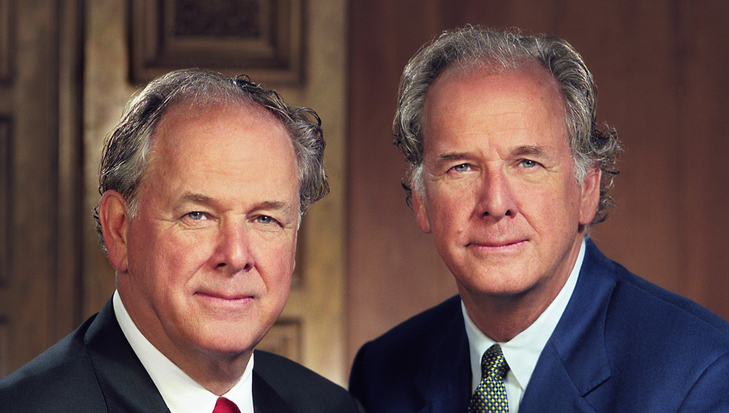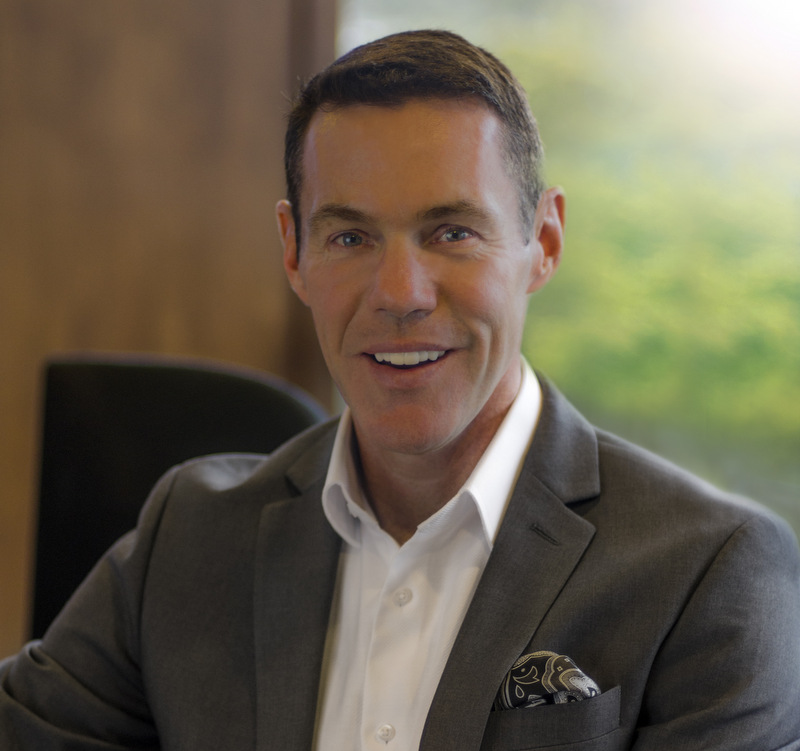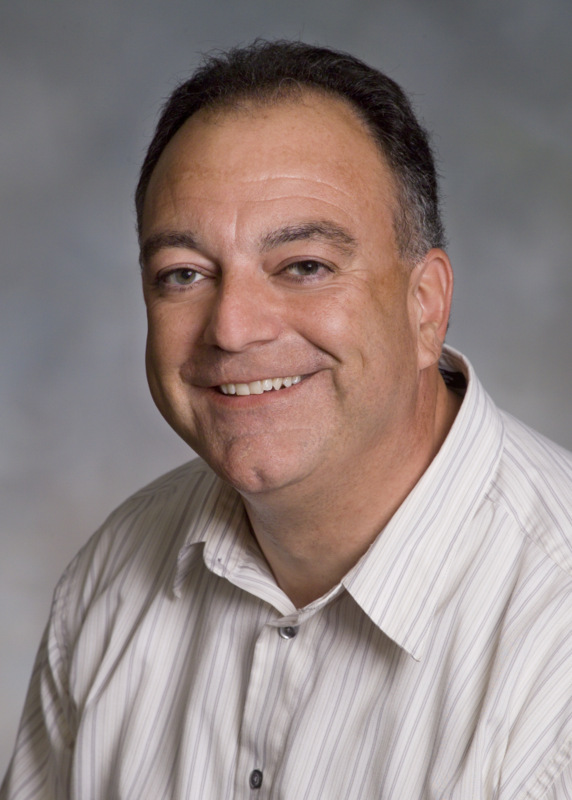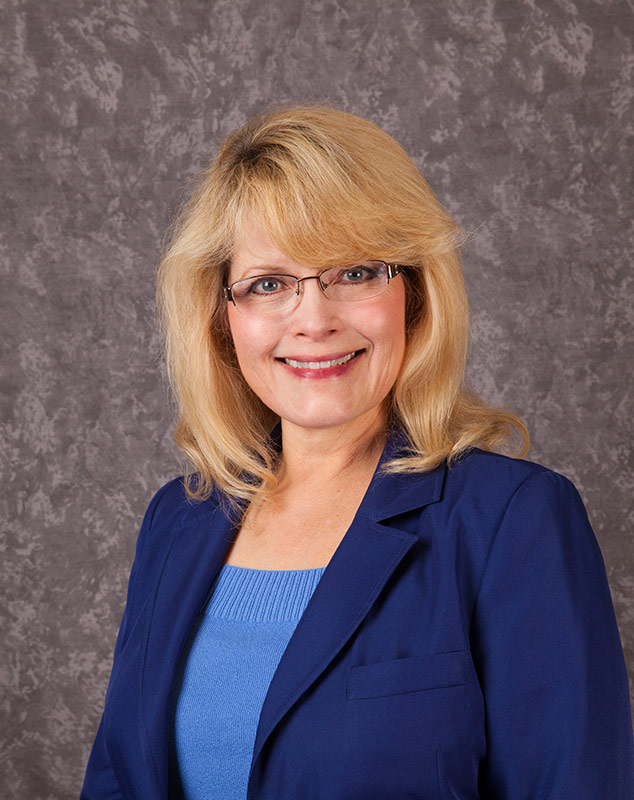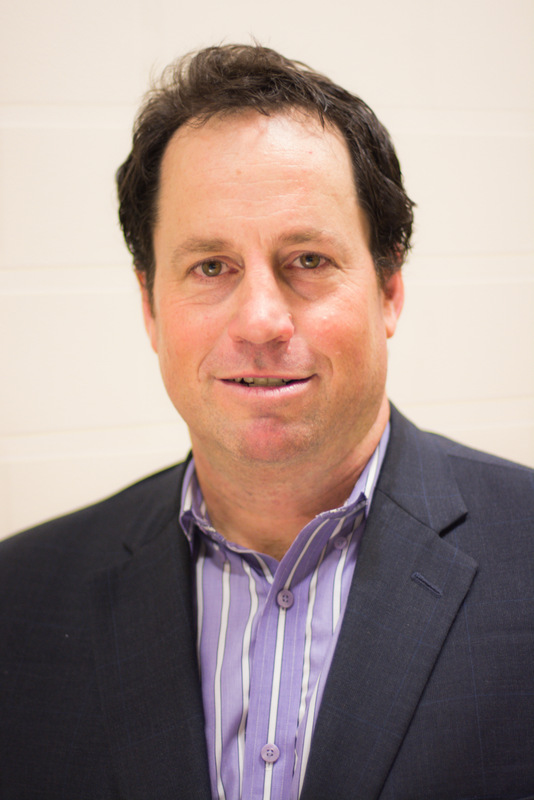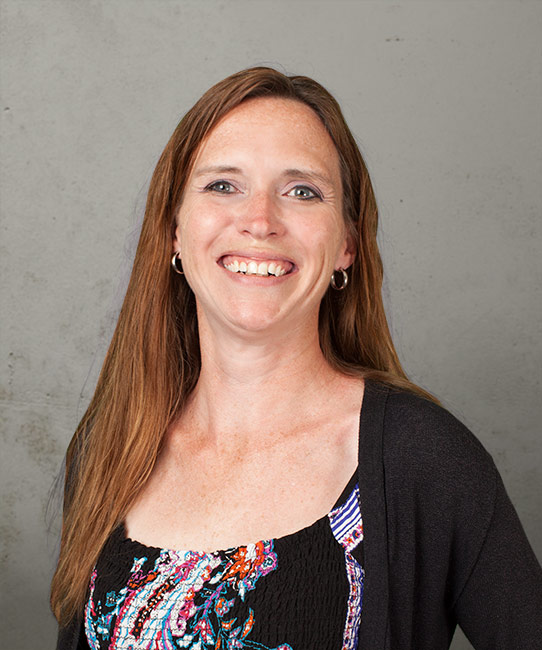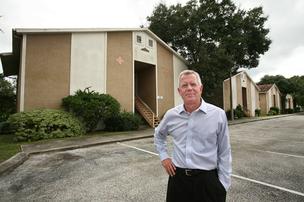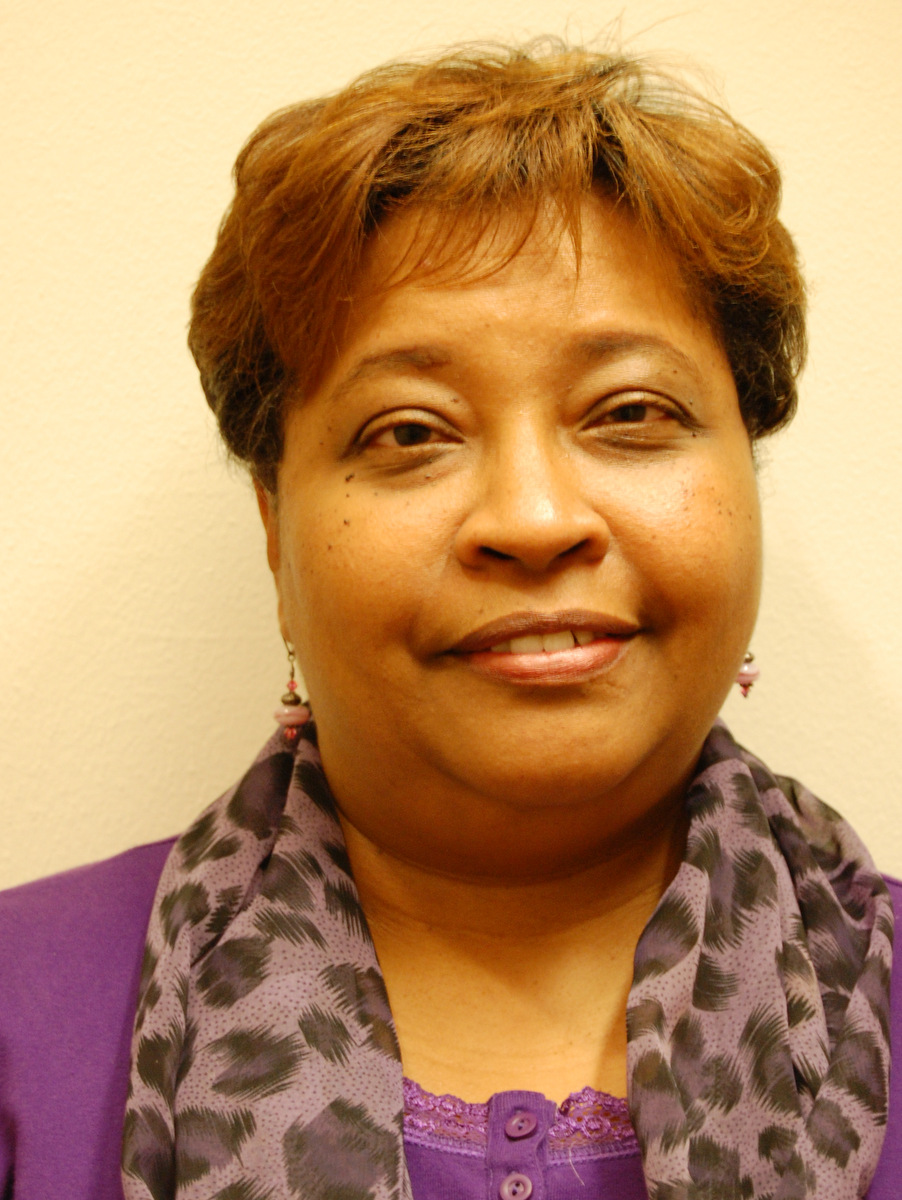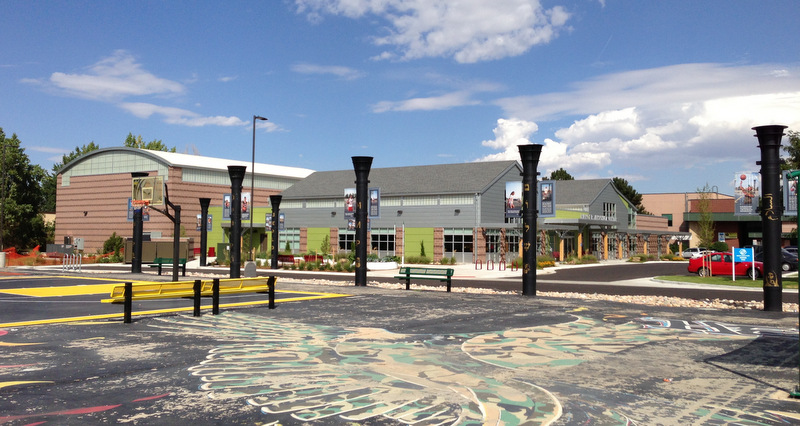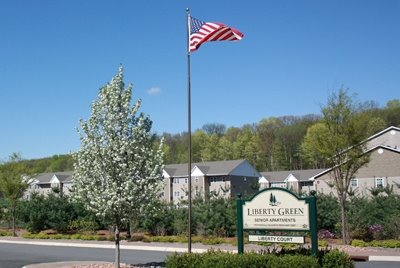For plenty of people, running a business with your sibling, no matter how amicable your relationship, might sound like a daunting – even undesirable – challenge. Identical twins Robert (Bob) and William (Bill) Thomas of Tulsa, Oklahoma, the co-founders and managing principals of Senior Star, talk about it differently. “It’s just a thing of joy. We’re pretty blessed; we’ve been partners for life,” says Bob Thomas. “It’s been one of the most delightful pleasures of my entire life,” says Bill Thomas. Both brothers give much of the credit for their extensive community service and close sibling relationship to their parents, the late William and Gretchen Thomas. “We just had the good fortune that our parents instilled this sense of comradeship and wanting the other to excel. We were partners in little businesses since we were mowing lawns when we were 9 years old,” says Bob. The collaboration and relative lack of competition (both say, “Neither one of us wants to be CEO”) has aided the brothers as they have built their business, which now includes 13 senior communities located in 6 states, and is hoping to double in size over the next 3 to 4 years. In 2011, Senior Star, a Yardi client, forged a partnership with Health Care REIT, which has aided in the expansion efforts. And in the process, the Thomas’ have delegated all day-to-day management responsibility to their executive team, freeing up Bill and Bob to focus on community, advocacy and other personal passions. With nearly 40 years in the real estate industry and the last 25 spent focused exclusively on senior housing, the Thomas’ have grown their company at the same time that American elder care facilities have been front line witnesses to the huge growth in patients affected by Alzheimer’s disease. Bob Thomas, a national volunteer, former board member and now fundraiser for the Alzheimer’s Association and Alzheimer’s Impact Movement, compares it to an impending tsunami. As of 2013, the Alzheimer’s Association reported that 1 in 3 American seniors died with Alzheimer’s or another form of dementia, and the disease had moved into the No. 1 spot as the nation’s most expensive. In 2014, direct costs for caring for the 5 million Americans living with the disease are estimated at $214 billion, including $150 billion in costs to Medicare and Medicaid. Approaching the scary wave from two different angles, Bob has focused on fundraising to find a cure and awareness and advocacy work at the local and national level. Bill has tackled it on the ground, encouraging the American Seniors Housing Association (ASHA) involvement and pushing forward a high standard of care for every Senior Star community, one that emanates equally from every employee. Both Thomas brothers describe themselves as passionate about helping others and engaging diverse groups of people to support their cause – from their employees, to resident’s families, to members of Congress whose decisions will support research funding. “They view the community not only thru the lens of today, but what we need to be doing to make sure that our community thrives and grows and prospers. They’re very strategic thinkers. They’re looking beyond the here to what can be,“ said Mark Graham, President/CEO of the Tulsa Area United Way (TAUW). In 2002, the brothers raised $25 million for TAUW, a fundraising record that wasn’t bested until 10 years later. The campaign jump-started the Thomases’ efforts into running major donation drives. A personal commitment Bob Thomas isn’t just committed to putting his own money toward finding a cure for Alzheimer’s. He vows to stick to the cause for the long haul. “I didn’t know, initially, that I would never leave it until it is resolved,” he said. “There’s not a waking day that I have that I don’t think about this cause.” He travels regularly and frequently to Washington, D.C. and to Senators’ home districts to push for allocating more funds...
Alan Missen
FirstService Residential
FirstService Residential is the largest third-party manager of homeowner’s associations in the United States, with more than 6,000 properties – and another 600 or so in Canada. So it makes sense that the Dania Beach, Florida-based company would be think big about how to deliver technology solutions specifically for the HOA lifestyle. Whether you’re a resident or owner of a home in a master planned community, a community manager of an HOA or a member of a community board of directors, FirstService is thinking about how to improve your experience, and give you mobile applications to obtain information and complete neighborhood-related tasks. “Whatever we can do to make the community manager’s life easier, and do that in an effective way, translates into a better experience for the resident,” said Alan Missen, recently appointed CIO for FirstService. “That’s such a big part of our culture, making a difference in every resident’s life every day.” Missen talked about the various apps FirstService is developing and how they hope to make the HOA experience more mobile-friendly for everyone involved. Tell us about your existing resident service portal. Missen: FSRConnect is our core property management solution. It’s focused on helping the associates to service the property and has a lot of information around the residents, the properties, and it aids in managing much of the activity around amenities. In the HOA world, there’s lots of documents that need to be put in the hands of residents, so we handle document management with this solution. We manage work orders, violations, architectural modifications, and we also provide some financial data that residents can touch. We’re generally more cautious around that, the financial data being more sensitive, so we keep a lot of that back in our accounting solutions. But we...
The Problem Solver
Real world property management
Editor’s note: Last fall, we introduced you to Kyle Kazan, CEO of Beach Front Property Management and a former law enforcement officer. Kazan’s stories of dealing with problem tenants and difficult situations at his properties stood out – he is upfront and honest about real-world situations that other executives might not want to talk about. As a result, we interviewed Kazan for Multi-Housing News Magazine. Here’s a follow-up to his story. “A good B or C quality building, like a nice quality used car, doesn’t lose value. It’s in high demand, and if the majority of people are your target market, I think you’re in the safe spot,” said Kazan, whose firm has been recognized regionally for their efforts to turn around troubled units. A former policeman and inner city school teacher turned successful owner-manager, Kazan operates in real world property management. “With all due respect to my friends out there in some of the big REITs that like to stick to Class A and sinking to Class B is not where they want to be, I feel like I am right in the sweet spot of society,” he said. His company, Beach Front Property Management, is based in Long Beach, but Kazan travels the globe to oversee assets on behalf of his investors. Back in LA, he can slip back into police officer mode and lead a team to throw out drug dealers or other troublesome tenants. It’s that skill that prompted recent calls from brokers about a very troubled apartment building in Anaheim, not far from Disneyland. “The previous owner had a stroke and had been overseeing the property himself. He had six units not paying rent, and a police shooting had killed a gang member on the corner of the property....
Master-Planned Communities
Livability, Walkability at Cypress Waters
With a burgeoning demand for sustainable living and mixed-use, walkable environments, the country’s master-planned communities are thriving. The top 20 master-planned communities sold 15,338 homes in 2013, which is an 11% increase over 2012, according to a report compiled by John Burns Real Estate Consulting. Texas dominated the ranking, with nine communities landing the list. Boasting a job-centric economy, the Dallas-Fort Worth Metroplex continues to be a big draw for both local and relocation home-buyers. The Metroplex has become an important target market for many new businesses as well as corporate expansions, which has generated massive job growth and a booming housing industry .The positive momentum is expected to continue all throughout 2014. The area will add 113,900 jobs this year, supporting a 3.6 percent increase in payrolls. In 2013, employers fostered the creation of 112,700 positions, as reported by Multi-Housing News Online. Despite the heightened construction activity, supply and demand will remain well-aligned in all sectors of real estate. Determined to capitalize on current demand, Billingsley Company has launched several mixed-use projects including Cypress Waters, a 1,000-acre master-planned community that straddles Dallas and Irving. Founded in 1978 by Lucy and Henry Billingsley, the Dallas-based real estate company specializes in master-planned developments and principles of new urbanism. Each Billingsley property offers a unique set of amenities, including smart design combined with artistic works and sustainable elements, which result into a life-enhancing experience for tenants, residents, visitors and employees alike. Fully committed to promoting environmental responsibility, the company uses energy-saving and sustainable materials to deliver both immediate and long-term value. Among a series of sustainable practices and innovative features aimed at enhancing the built environment, Billingsley’s green efforts include: integration of existing landscaping and low-water native plants into green spaces; installation of lighting retrofits, energy-saving faucets, automatic light sensor and energy-efficient HVAC systems; building homes with paperless sheetrock and environmentally-friendly paint and carpet products; achieving EnergyStar® certification for single-family developments; and recycling waste from construction sites. The company also developed the first Gold LEED® pre-certified building in Plano. Built around the same principles, Cypress Waters will eventually become an inclusive live-work-play environment offering as much as 4 million square feet of office space, 45,000 square feet of retail, more than 10,000 residences and three schools. The pedestrian-friendly development is centered around a serene 362-acre lake, which provides the perfect backdrop for a successful community promoting healthy lifestyles. It is located in the City of Dallas, in the Coppell Independent School District, offering a premier address and the best school system to its residents. Billingsley launched the community last year with the opening of The Neighborhoods of Cypress Waters, a 676-unit multifamily complex featuring one-, two-, and three-bedroom apartments and townhomes. Among the many perks, Cypress Waters features well-appointed interiors, two resort-style pools with free Wi-Fi, a state-of-the-art fitness center, a sand volleyball court, pet-friendly facilities, children’s playground, as well as an abundance of parks and green spaces. Work is currently underway on the office component of the mixed-use development, with a first building scheduled for completion in late May. Envisioned as a high-profile corporate campus, The Offices of Cypress Waters will boast environmentally sophisticated buildings, extensive natural landscaping, pedestrian trails and streets, freeway and lakeside restaurants. Billingsley Co. has already landed its first office tenant for the development. The single-story 31,450-square-foot structure currently going up on Ranch Trail and Interstate Highway 635 in Irving will serve as Cheddar’s Casual Café’s new corporate headquarters. “Our goal, along with Cheddar’s, was to create an office headquarters environment which would reflect Cheddar’s culture, values, and unique training environment,” commented Jim Montgomery, Senior Vice President & Principal of Swearingen Realty Group, LLC, who represented Cheddar’s Restaurants in the deal. “Delivering on this demanded that we evaluate all available existing and build-to-suit options to ultimately determine that the Cypress Waters site would bring the most value and was the best fit for Cheddar’s HQ.” A...
Insights on Instagram...
For multi-family marketing
Buckingham Companies began this year with a slew of accolades, among them a Prodigy Award for Best Overall Marketing Program, another for Best Color Advertisement, and the Bronze Adrian Award for Complete Campaign and Posting. At the foundation of those achievements stands an innovative marketing department that enhances traditional marketing approaches with a tool that many competitors have kept at arm’s length: Instagram. Unlike Facebook and Twitter, Instagram is an entirely image-driven social media platform with more than 200 million users worldwide. While Facebook and Twitter usage has hit plateaus, Instagram is one of the fastest growing platforms with a notable international audience, and 65 percent of the community is from outside of the United States. It is the ideal tool for reaching local renters and transplants. Buckingham Companies’ team dove into Instagram as a major component of their marketing strategy for CityWay in downtown Indianapolis. MHN caught up with Marketing Manager Nicole Crosby to explore the method behind their success. MHN: Tell me about your Instagram strategy for CityWay and how it enhances your brand. Crosby: Traditional real estate marketing is often visualized through staged and perfectly edited photography, alongside a carefully crafted list of features and amenities. As marketers, of course we want to show our properties in the best light possible, but today’s customers expect more. They want to understand what it’s really like to live there, to spend every day there. Instagram offers a way for our residents and on site teams to capture the perspective of everyday living and connect with our property, in some cases before they even set foot in our leasing centers. Our prospective customers are craving that connection in their apartment search. Highlighting Instagram on our property websites provides a first step in that connection. MHN:...
Josh Champion
Carroll Organization
Josh Champion considers himself a student of the real estate business, and since joining the Carroll Organization three years ago, his learning has kicked into a higher gear. Diving headfirst into the task of growing Carroll’s multifamily investment portfolio at a fast and furious pace, Champion oversaw 22 transactions in 2013, valued at over $1 billion. The acquisitions included the largest single-asset apartment purchase in Florida history, with $225 million paid by Carroll for The Resort at Pembroke Pines. Thus far in 2014, Carroll is off to a great start, with four multifamily deals closed as of the end of May, and several others under contract . The growing company has been focused on expanding its portfolio in Florida, where all four purchases are located. Champion told us that they’ll next set out to acquire in Dallas, Phoenix, Las Vegas and Denver. We talked to Champion about his success as a young executive – he’s just 30 – at a growing firm. He started his career as an intern at CBRE, then spent five years at Prudential Mortgage Capital. He’s been with the Carroll Organization since 2011. The Carroll Organization changed its focus to multifamily ownership and management in 2011. What differentiates the company? Champion: Carroll Organization is a high-energy, younger company with a lot of strategic and smart growth. We’re striving to be one of the premiere owner-operators in the multifamily business. Our market is primarily in the Southeast – including Texas and Florida, and we currently own 40 assets. Our company and our employees have a tremendous work ethic and drive for success. That directly correlates to the quality and performance of our investments. We’re a relatively young company, so we’re always looking to grow our reputation and brand. What do you...
Trade Street Residential...
Mid-sized Market Trends
2014 has experienced notable growth in mid-sized markets with an expected rent growth of 3-5 percent by year’s end. Yardi client, Trade Street Residential, has capitalized on this market, flourishing in developing markets throughout the southern United States. To achieve its success, the company became proactive about its new wave of renters and their metropolitan aestheticism. Though renters in mid-sized markets are traditionally “more sleepy” and less demanding, Caren Cohen, Director of Accounting, has noticed a shift in renter expectations. Suburban and rural Millennials aren’t respecters of city limits. Their tastes have become just as sophisticated as their urban neighbors. “Some of the young renters expect the same as they do in an urban environment. So we, depending on our location, have to cater accordingly,” says Cohen. Accommodating suburban renters with rural tastes is a two-step process. Trade Street Residential improved operations at community clubhouses to include more activities and nicer amenities. Additionally, onsite personnel reexamined their event calendars, hosting engaging events for tenants and finding new ways to promote resident retention. Talison Row in the Charleston suburbs is a prime example of the company’s approach. Modeled after luxury resorts, the community promotes a fun atmosphere with engaging entertainment. Talison Row offers both indoor and outdoor entertainment spaces: the outdoor space is the uncontested favorite, providing the backdrop of the community’s summer cooking classes, fall Oyster Roasts, and residents’ private parties. The indoor game room is often the venue for wine tastings, cigar and bourbon tastings, and themed parties where residents can explore international cuisine. To enhance the metropolitan appeal, Talison Row offers services such as valet dry cleaning delivery and pick-up. Residents don’t have to worry about gym memberships, either. The community fitness center offers the same equipment as larger gyms in addition...
Reece Crossings
Military Living from Corvias
Yardi client Corvias Military Living, an affiliate of the Corvias Group, has opened Reece Crossings, the Army’s first-ever on-post apartments for junior unaccompanied service members in Fort Meade, Md. Reece Crossings consists of 432 apartments and will house 1,000 junior unaccompanied service members, allowing them to live on the installation, closer to their work and support systems, for the first time. “It’s the first of it’s kind and our vision of what barracks privatization could be and should be for the single solider and service member,” Mike Steiner, Corvias Military Living’s managing director, tells MHN. “The current design for on-post barracks is something called one-plus-one, which is like a college dorm room: two individual rooms with a common bathroom and maybe a microwave. Reece Crossings is well beyond that.” Reece Crossings 1,200-square-foot apartments feature large kitchens with a breakfast bar and full-size appliances, spacious living rooms, a laundry room with washer and dryer as well as free cable, high-speed Internet and utilities. They are all private master suites, which include individual bathrooms, walk-in closets, personal climate controls and private climate-controlled secure storage for military gear. Apartments come fully furnished with a sofa, media cabinet, barstools and coffee table, as well as a queen-size bed, desk and night stand in each bedroom. Amenities include weight lifting and fitness rooms, a state-of-the-art clubroom with multiple flat-screen TVs, pool tables, a sports ticker and video gaming, a cyber café with charging stations and Internet access, basketball and sand volleyball courts. The development also includes gathering spaces, including a 6,233-square-foot community clubhouse, resort-style lap pool and outdoor grilling and picnic pavilions. “It’s nothing like they had before so the appeal is epic,” Steiner says. “We’re trying to help the soldiers get out of their rooms and eliminate the...
Mike Scilingo
Urban Innovations
Urban Innovations, an owner/manager of commercial real estate in Chicago, takes a unique viewpoint of their portfolio. The company thinks of the 770,000 square feet of space under their management – most of which is located in Chicago’s River North – as one big building. “We like to focus on geographic synergies where we can use our resources across buildings in ways that keep costs down for ownership and for tenants,” said Mike Scilingo, President. Owned by Howard R. Conant Jr., the company also holds a 3,700 unit portfolio of affordable housing and has a construction division. With office space in Chicago a hot commodity thanks to an influx of small to mid-size tech companies, Urban Innovations, a Yardi client, continues to look to acquire new space. In the last two years, the company reacquired two buildings on the City’s near West Side that it had sold off in 2005. They haven’t added other properties to their portfolio, mainly because the kind of properties they would like – usually those needing slight improvements — are not available. “Typically, there is some kind of physical redevelopment that needs to happen to improve the property and make it more appealing for tenants (for us to be interested). Those opportunities in River North have been harder to find at the price point we can make work,” Scilingo said. The near West Side is more promising, however, and they are in talks with owners there. Scilingo said that robust occupancy – around 98 percent – and rents that are up as much as 20 percent over the last five years have been indicators that the company’s hands-on management style is effective. Read on for more insight from our interview with Mike Scilingo: You worked at UI from 2000-2009,...
Achieving Occupancy
Tarragon Chooses RentCafe
Property management company Tarragon Property Services casts a wider marketing net, executes the complete leasing process online and provides convenient online resident services—all with RentCafe™. The upshot is consistently near-full occupancy. Tarragon uses RentCafe, a full online leasing and resident services solution, to attract prospects to its apartment units in Washington state and execute the entire leasing process, including electronic signatures, in one stop. “A great thing about RentCafe is having a Web interface that makes it really easy for prospects to see our available apartments, review floor plans, and complete the leasing process,” said Jane Griffith, marketing manager for Tarragon’s multifamily division. “The photos present our properties very attractively, and our site managers love that RentCafe is intuitive, easy to use, and fully integrated with our Yardi Voyager® property management and accounting system. When prospects fill out guest cards online, we eliminate paper and redundancy because we don’t have to reenter a separate guest card into Voyager.” Griffith added, “RentCafe also includes a resident portal. Once those prospects become residents, they like being able to pay rent online by credit card or checking account withdrawal, submit maintenance requests, and communicate with the office staff.” Since adopting RentCafe, Griffith said, “Our occupancy is way up. We’re consistently at 96 to 98%, and sometimes 100%. RentCafe has absolutely played a role in that.” The mobile aspect of RentCafe gives Tarragon even more flexibility in its marketing and leasing. “There’s a marvelous RentCafe mobile app that’s designed for smartphones,” Griffith said. “I can be meeting with a prospect, pull out my phone and show any of our properties, and the prospect can apply for an apartment right from their own smartphone. It’s a tremendous advantage in terms of time savings, convenience and efficiency.” Tarragon Property Services,...
Aaron Miripol
Urban Land Conservancy
DENVER –A member of his staff at the Urban Land Conservancy of Denver described CEO Aaron Miripol as “the most passionate person I have ever worked with” — talk with him for just a few seconds and you’ll understand why. Miripol heads up a non-profit real estate company that is working in unique ways to improve struggling neighborhoods around Denver, and simultaneously having a big impact on regional, transit-oriented affordable housing. Engaging community stakeholders, working collaboratively with government, non-profit, philanthropic and private partners, and thinking out of the box are among the organization’s strengths. It draws from a wellspring of energy and enthusiasm from its CEO. Here are a few highlights from our interview with Aaron Miripol. ** You grew up on the South Side of Chicago in the late 1960’s and early 1970’s. How did that experience influence you? Miripol: South Shore was a very accepting community. I now recognize the issues that were going on which at the time I didn’t understand. This was the early seventies and Chicago, like a lot of urban communities, was going through a major transition. The neighborhood was redlined by banks and block busted by realtors. A lot of African American families living in South Shore were buying homes at inflated prices, and unable to get traditional financing because the Federal Housing Administration (FHA) would not lend in our community. Then you ended up as a tenant organizer in Chicago right out of college. What was that like? Miripol: As tenant organizers, our job was to work in buildings that were owned by slumlords on Chicago’s Northside. It could be a utility shutoff or any other major problem for those living in the property. We would work with the residents to get the buildings put into...
Cynthia Parker
BRIDGE Housing
With a strong track record in affordable housing development, San Francisco-based BRIDGE Housing decided to take it up a notch. In its 30th year in existence, the Bay Area non-profit announced that it would aim to double the size of its portfolio by 2017. One year into the effort, CEO Cynthia Parker reports that things are going swimmingly. “Last year we delivered 1,000 units of housing, and we have 1,800 in some phase of construction or development right now, and we have a pretty huge pipeline. We are working on all cylinders at this point,” Parker told us in a recent interview. With a regional focus in the Pacific Northwest that’s expanded the reach out of the BRIDGE portfolio beyond California, and multiple involvements in public housing revitalization projects, the company has plenty on its plate. They’re also incorporating green technology into their new and remodeled buildings, and pushing innovative mixed-demographic residential models. Read on for more of our interview with Cynthia Parker. What does this big growth spurt say about BRIDGE’s health as a non-profit housing developer? Parker: Over a 30 year span, we have been working to get to this stage, where we are a very high functioning organization. With the help of others, we’ve built out our platform so that we have the infrastructure in place to do this kind of development. It’s really important to do that first. What are some of the components of that platform? Parker: I would say our affiliation with IT, our ability to use software programs from Yardi, and our build-out of SharePoint for database management. We’re doing enhancements this year on our payments and receivables. We’re looking to do everything we can to have the best tools we need to be efficient developers. Tell...
Ascentia
Valuing Community
Throughout its 40-year history, Ascentia has maintained family and unity as the priorities of its manufactured home communities. The Mercy Fund helps the company fulfill its mission, making a positive mark in the lives of residents that can never be erased. After gaining valuable information at a YASC conference four years ago, Yardi client, Ascentia, embarked on a transformation. The company instituted a multifamily model to manage its 7,000 units of mobile homes, reaching a unique market of consumers who were not interested in traditional apartment life or the ties of a mortgage. Amy McKelvy, director of training and development, calls the communities “single-level apartments with grass yards.” “Most of our residents now are young families with children and at least one pet. It’s difficult for them, in some locations, to find affordable living that allows them to have the freedom and the privacy that most people enjoy,” says McKelvy. The multifamily model for mobile homes has experienced great success. Yet through its growth, the family-owned company hasn’t lost sight of its original emphasis on the importance of family and community. The Mercy Fund ensures that Ascentia can support its tenants like relatives. The Mercy Fund is the brainchild of founder B.M. Vukovich, created to help residents through difficult financial times. Employees, investors, residents and other third party participants are encouraged to make donations to the fund throughout the year. The funds are then dispersed to residents with dire need. “The atmosphere inside is that, not only is the staff family but our residents are our family as well,” says McKelvy. The autumn floods that swept through Colorado tested the company’s commitment to its extended family. In September of 2013, the Boulder metropolitan area suffered a deluge, dumping more than 17 inches of water...
Dan Mullen
Bedrock Real Estate
Bedrock strives to revitalize Detroit’s Central Business District by creating jobs, opportunity and an atmosphere of innovation. Vice President of Development Dan Mullen seized the opportunity to support that vision. In 10 short years, Mullen worked his way through the ranks at Quicken Loans and into a key leadership position with Gilbert’s new venture. “I love real estate, and it was an amazing opportunity to come into a great American city and impact the outcome,” said Mullen. His efforts have landed him a position among Crain’s Detroit Business’ 40 Under 40 and D Business Magazine’s 30 in Their 30s. Under Mullen’s guidance, the privately held commercial real estate organization has acquired, developed and manages more than 8 million square feet of space. Among its holdings are iconic structures that are being reimagined for modern uses, such as the historic Cary building and 1500 Woodward. These renovations bring fresh energy and vision to the city. Bedrock’s efforts have been well received. More than 80 local and international companies have taken advantage of its renovated properties. CPE: What’s one challenge that you’ve overcome on your path to success? Mullen: I always strive for greatness. It’s a personal challenge. I’m like a sponge. I want to learn everything that I can as fast as I possibly can. I want to become as knowledgeable as possible about everything regarding redevelopment and urban planning. There is a lot to learn when you’re helping to revitalize a downtown area. CPE: Looking back, what’s one piece of advice that you would have given yourself in the beginning of your career? Mullen: I would’ve said, “Never, ever, ever be scared to fail.” If you’re not failing, you’re not trying hard enough, and you’re not pushing hard enough to do different things. CPE:...
Michael Preston
National Church Residences
With over 20 years of experience in social work, Michael Preston is a good judge of what kind of social support program actually makes a difference for disabled homeless and veterans. In his role as regional director of permanent supportive housing for Columbus, Ohio-based National Church Residences – the nation’s largest non-profit specializing in affordable senior housing – he’s involved in a fast-growing collaborative effort to help house those in need. “One of the things I really love about permanent supportive housing is the transformative quality of it. You can see folks going from a state of homelessness to a self-sufficient state with their own apartments – it’s a real solution to a social problem of homelessness,” Preston said in a recent interview. Due to the success of its supportive housing initiatives, NCR has expanded outside of Ohio to Atlanta and will grow from 590 units of supportive housing today to nearly 1000 units in the next 2-3 years. The growth speaks both to the urgent need for such housing and the willingness of private, local and federal support to help fund it. NCR, a Yardi client, partners with veterans and homeless services providers for a comprehensively supportive living experience. Among the programs garnering the most attention are NCR’s veterans homes. Last month funds were designated for a veteran-focused supportive living home in Atlanta, Georgia, where NCR already has 7 senior-focused assets. “Serving formerly homeless and disabled veterans is very important to the mission of National Church Residences,” said President & CEO Thomas W. Slemmer. “Permanent supportive housing can give them stability, more self-sufficiency and a chance at a new life in a way that’s cost-effective for the government. They served our nation, and we owe them that.” Read on for more of our...
Bruce Keene
Franklin Street
Residents are sometimes quick to post negative reviews on apartment rating sites, but don’t always take the time to write positive reviews. However, there is a solution to this. MHN talks to Bruce Keene, president of management services of Tampa, Fla.-based Franklin Street, a Yardi client, about some trends he is seeing in property management, such as how to get positive reviews on ratings sites. MHN: Tell me about Franklin Street. Keene: Franklin Street is a real estate services company. We provide a myriad of services not only to the apartment investor, but also to the retail sector. The company itself has four divisions: one of them is the property management division, which manages both multifamily and retail, one division is the investment/sales division, which is the brokerage division, there’s a capital advisors division, which finds debt and equity for investors, and we also have a property and casualty insurance company that provides that service to property investors. So it’s a one-stop shop for the real estate investor. Currently we manage about 4,000 apartment units and about 5 million square feet of retail. MHN: What are some multifamily property management trends that you’re seeing in Tampa? Keene: Since the economy has improved and the apartment market in general has improved, I think that everyone is more focused on fine-tuning the operations for maximum performance. We’re not fighting concessions anymore, we’re not fighting for rents anymore, and we’re not fighting occupancy issues anymore. Especially in our markets, concessions are gone, occupancies are up and it’s time to focus on customers and maximizing efficiency in the processes we use. There’s one trend in particular that’s interesting that I’ve been looking into and we’ve began to use, and that’s a focus on certain technologies that will improve...
Christiana Foglio-Palmer...
Community Investment Strategies
Christiana Foglio-Palmer’s success as an owner/developer of multifamily affordable housing in New Jersey could be measured by the typical parameters — numbers of units developed, residents housed, and dollars made. But sit down to talk with her about a 20-year career heading Community Investment Strategies, Inc., and you’ll hear less about profits and projects, and more about hugs. “Yesterday I was at a site, in the elevator with a resident, and they gave me a hug. It is inexpressible how that makes me feel. I love building buildings, but I’ll take the hug any day,” she told me, her voice wracked with laryngitis. I had suggested we reschedule our interview, so she could save her voice. She insisted that we go forward. It’s that kind of dedication to doing her job, and doing it well no matter what challenges are thrown into her path, that have made Foglio-Palmer stand out, not just as a developer who has built or redeveloped more than 3,000 units of low-to-moderate income housing around New Jersey, but as a strong female business owner who has made prioritizing female-headed households a cornerstone of her business. “From where I sit, Chris Foglio is the smartest developer in the state,” said Christian Bollwage, mayor of Elizabeth, New Jersey, where CIS has worked on several challenging projects, including the Hope VI development. “She works with the residents more than anyone else.” Learning from residents When Foglio-Palmer talks about her work, she doesn’t talk about projects so much as she does people. One particular resident, who lived at CIS’ very first redevelopment project, taught her a lesson that she’s incorporated in every project since. The low-income condominiums were planned in collaboration with the current residents, and one of the final design decisions Foglio-Palmer needed...
Melissa D. White
GFI Management Services
Melissa D. White is a Millennial specializing in multifamily marketing, which means she is perfectly poised to understand what renters of her generation want and need from their apartment leasing experience. And thanks to fast-paced technological innovation in the realm of real estate and the willingness of her employer, GFI Management Services, to try new things, she’s also able to deliver the desired experience. That’s not just a win-win, but a win-win-win, with prospects, apartment front office employees, and Melissa all reaping the benefits. “It’s given me the power of time. You’ve given me my time back to go out and manage my team,” said White, who has been working in the multifamily industry for a decade. She quickly climbed the corporate ladder to become GFI’s Director of Marketing and Training, a position that puts her right in the vortex of multifamily tech advancement. “I never expected that this much technology could be possible in multifamily – I think of it as a Leasing Virtual Assistant,” said White, whose teams use Yardi products for their day-to-day sales operations and marketing tasks, including managing ILS listings, lead tracking, and social media content distribution. Like most Millennials, White sees the myriad benefits of technology-aided workflows. Training, distributing listings, following-up on prospect interest, advertising specials and promotions, measuring ROI in content and media, and even the act of leasing have all become more streamlined, systematic and automated in the last year, she noted. “We look at Yardi as our partner. You’re not just a vendor, and we’re not just a client. You’re our partner in offering sustainable onsite solutions and valuable services to our residents,” said White. While GFI has adopted numerous Yardi products, among her favorites is RentCafe, a comprehensive marketing solution which allows for automated...
Baybridge Senior Living...
Smart Development
BayBridge develops and manages senior housing throughout Canada and the United States. The growing company provides lifestyle options for residents including independent living, assisted living and memory care services. Through this system, residents can stay in the community when their needs change, seamlessly transitioning between care levels. “We’re developing and growing at this point but one thing is for sure: we want to provide the best care for our seniors,” says Monika Klimecka, Property Accountant. To remain focused on seniors’ needs while nurturing a growing company, BayBridge has turned to Yardi’s products and services to streamline and automate daily operations. The staff of BayBridge is returning to Yardi Advanced Solutions Conference (YASC) for the third consecutive season to get the most out of their Yardi software. Each year has held different opportunities. “The first few years that we attended, BayBridge was so new. We wanted to find out the existing functionalities within Yardi and how BayBridge could use them to help with our processes and workflows,” says Klimecka. Now that the understanding of their Yardi products has improved, the BayBridge team is returning to YASC to further refine workflows with an advanced knowledge of the software and industry best practices. “We are attending the Senior Housing Focus Group: Road Map and the Senior Housing Round Table to help us stay current and relevant. These sessions are a good opportunity for our team to learn about future developments in the industry. The Round Table specifically is great for knowledge and idea sharing with other members in the senior housing industry.” Klimecka will also attend Financial Best Practices for Voyager, Workflows and Notifications for Voyager 7S, and PayScan Tips and Tricks. These tools help BayBridge to automate day-to-day practices so that they can focus on priorities...
Monica Makin
Urban Innovations
Monica Makin grew up in public housing in Brooklyn, New York – in Bedford-Stuyvesant’s Marcy Houses, the same projects as rapper Jay-Z. After becoming the first person in her extended family to graduate from college and continuing on to law school, Makin eventually found her way back to the affordable housing realm in a very different capacity – as an expert in Section 42 tax credit program and the HUD Section 8 program. She has worked on development and asset management in both Oregon and Illinois. “My real passion is preserving the integrity of this industry and of the affordable housing programs. I recognize that there is such a need type of programs, from personal experience as well as working in the industry,” Makin said. “Where I grew up, the building I lived in was nothing I would want my kids to live in. The product we produce now, I would gladly live in.” She described an unsafe, unsanitary environment in the Marcy Houses, hearing gunshots at night and smelling urine in the elevator. New York Magazine summarizes: “At Marcy, the hard-knock life presses on.” In her current position as Vice President of Acquisitions and Asset Management for Chicago-based Urban Innovations, Makin is an advocate for expanding affordable housing opportunities for seniors, workforce and low-income residents. She sees affordable housing programs that provide housing for these groups as being constantly threatened by funding cuts – while at the same time, the need is rising. Read on for our interview with Monica Makin. Can you describe Urban Innovations’ affordable housing portfolio? Makin: We have 3,700 units under management, in Illinois, Pennsylvania, Indiana and Kentucky. Most of them are project based Section 8, so they provide housing to seniors at 30 percent area median income (AMI)....
Out of the Box
Denver's Urban Land Conservancy
The development projects and community initiatives of Denver’s Urban Land Conservancy (ULC) don’t fit in just one box. In fact, they don’t even fit in several boxes. Founded with the intent to improve and support parts of the city needing the most TLC, the ULC is not just a nonprofit developer, or a project proposer, or a community advocate, or a saving grace financier. It’s a medley of all that and more, a unique real estate hybrid that aims to improve, elevate and assist in areas where help is needed most. Founded in 2003 with seed funding from Sam Gary and Gary Williams Energy Corp, ULC, a Yardi client, is now a standalone nonprofitwith a mission to preserve real estate in urban areas, for the benefit of the community at large. The group ramped up its efforts from 2007 onward, when current President and CEO Aaron Miripol was hired. The energetic Miripol, who rides his bike to most meetings and has over 20 years of experience in affordable community development, has been a driving force behind the success. “He’s the most passionate person I have ever worked with,” said Christi Craine, Operations and Communications Director for ULC. “He has driven the growth of ULC’s portfolio from two pieces of real estate to investments in 19 properties, and we’ve become a resource for those hoping to practice place-based real estate based on community need.” ULC has been on a roll as of late, with multiple projects that include 800 units of transit-proximate affordable housing, a neighborhood-transforming youth center, and multiple nonprofit support ventures. In one instance, ULC swooped in to buy the property of a school serving neglected children that was close to having to shut down due to financial woes – over four years, the school raised the funds to buy their building back, at the exact same purchase price. “The uniqueness of a nonprofit real estate company that can partner with other nonprofits, for-profits, schools, foundations, municipalities and federal institutions to successfully develop and preserve real estate to benefit communities is rare,” ULC President and CEO Aaron Miripol stated. “We have brought economic development opportunities, jobs and housing options to communities that otherwise may not have seen this kind of catalytic investment. Taking a leadership role in acquiring these catalytic sites and being willing to take the risk necessary for maximum impact is part of our mission, and it is our job to take the risk that other organizations may not have the capacity to do. One of the nonprofit’s most visible projects has been the redevelopment of Holly Square, a former shopping center in Northeast Park Hill that was destroyed by arson in 2008. Gang-related activity had plagued the site and the neighborhood around it, and ULC heard from the community that they wanted to refocus the energy on the 2.6 acre site toward youth-oriented, neighborhood-supportive, peace-promoting goals. “This property is the heart and soul of what ULC’s mission is all about,” Craine said. One measure of success: Holly Square hasn’t been touched by graffiti since it opened, a sign of respect. Crime has also dropped in the area, and ULC is working with adjacent property owners in the hopes of continuing to improve the entire surrounding neighborhood. A youth center was the ultimate consensus for development, and the Nancy P. Anschutz Community Center, home to a very active chapter of the Boys & Girls Club, opened in fall-2013. Additional acreage on the site is slated for later development, and is temporarily being used as basketball and futsal courts. Community engagement in the improvements has been an important part of the redevelopment, and a recent “Community Build Day” involved the Colorado Construction Institute, a nonprofit that trains disadvantaged youth and young adults in the construction trade. In the realm of transit-proximate housing, ULC has also been a leader. Denver is currently in the process of building out...
Cigna
Healthcare goes mobile
Yardi client, Cigna, stepped up to an exciting challenge this year. Through innovation, creativity, and an understanding of client’s needs, the global company has brought healthcare into the mobile age. Cigna’s exciting apps and personalized services have made healthcare more accessible to clients on the go. The company started at the foundation, altering clients’ perception of healthcare. Through its mobile campaign, Cigna is no longer a name that we think of only when we were sick and injured. Rather, Cigna strives to become a name that we associate with health, wellbeing, and independence. Rebranding gained public attention through the Go You campaign last year, a series of ads and commercials that focused on individuals and what they can accomplish as healthy people. The ads don’t refer to illness or injury. Instead, the ads take a health-is-wealth approach that shows subjects full of personality, originality, and possibility. Viewers could begin to see the company as a way to fulfill their personal potential and reach their goals. But how? The ads were followed by the introduction of several user-friendly apps that make health an everyday commitment involving small daily decisions. The myCigna Mobile App was one of the first, offering traditional resources such as a physicians directory and account management tools. Users also gained access to claim updates, drug information and comparison charts, and price comparisons. While myCigna Mobile is customized for clients’ accounts, the GO YOU app is available to everyone with an Android or iOS device. Non-clients and clients alike can now peruse thousands of helpful and encouraging resources. These tools can be shared instantly with friends and family. Users can also create edifying video messages, photos and banners about health and wellness. For making healthy dietary decisions on the go, Cigna created Everyday...
Devon Management
Housing the Hudson Valley
With its existing portfolio made up primarily of tax-credit affordable housing for seniors, New York’s Devon Management is now expanding into affordable properties that will house all ages. In the next few years, the company’s holdings will nearly double with the addition of 1,000 units in the Hudson Valley. “We’re just addressing the same dearth of affordable housing that’s present in every community in America,” said Paul Gratzel, Chief Operating Officer for Devon Management and its sister companies, MJJ Builders and Warwick Properties. The three-tiered approach means that one arm of the company – owned by Jonah Mandelbaum and his wife, Donna Applegate – is involved in every phase of a housing project, from siting and funding, to construction, to management. With vast experience and success in single-family subdivision development, Mandelbaum and Applegate turned to the affordable sector about 15 years ago and have built 13 properties with 1300 units thus far. They readily partner with other regional organizations serving populations that often struggle with housing, including the working poor and the disabled. “The new direction we’re proceeding in will be inter-generational. The communities will house a combination of seniors, workforce, family housing with set asides for the mentally disabled,” said Paul Gratzel. A real estate veteran with more than 20 years’ experience in the commercial, resort development, new urbanism and architectural sectors, Gratzel applies a pragmatic vision to what can become a complicated development process. Partnerships with the non-profit organizations, including Occupations, Inc., and Gateway, Inc., have been a vital part of Devon Management’s overall vision. The groups provide the supportive social services component necessary for residents in need. Living in a stable environment is typically the foundation toward success with such programs, which provide job opportunities for the mentally handicapped and other...
Tribridge Chooses Yardi...
For Multifamily Solution Stack
TriBridge Residential manages 16,000 residential units in seven U.S. states. Since 1990, TriBridge partners have overseen more than $2.75 billion in acquisitions and development of more than 33,000 multifamily units. Needing a comprehensive technology solution to effectively manage its business operations and provide detailed reporting to investors and clients, TriBridge selected Yardi Voyager® as its new Software as a Service core property management and accounting system, along with the Yardi Marketing Suite™ and Yardi Multifamily Suite™. TriBridge will execute many of its marketing and leasing operations—from online marketing and reputation management, to mobile lease execution and online resident services—with the Yardi Marketing Suite. Additional products from the Yardi Multifamily Suite will give TriBridge a full-business online and mobile platform, including self-service renters insurance, paperless procurement, automated utility billing and energy management, and comprehensive maintenance management. “TriBridge will enjoy the benefits of a holistic system that facilitates decision-making about acquisitions, sales, and other business actions. This single-stack technology approach also allows easy implementation of additional ancillary products as new business needs emerge,” said Terri Dowen, senior vice president of sales for Yardi. TriBridge Residential is a full-service multifamily investment, development, and management company based in Atlanta, with more than 16,000 units and $1 billion in assets under management. With 70 corporate professionals and 330 onsite staff, the firm focuses on markets in the Southeast and provides a vertically-integrated platform with a 20+ year track record through its subsidiaries and affiliates. For more information, visit...
Community Basics Inc....
Meeting housing needs
Lancaster, Penn., is a community in the midst of transformation. New jobs are being created, environmentally-friendly development is trending, and the city’s downtown is experiencing a creative and retail renaissance. But affordable housing, much needed for working-class residents, seniors, is hard to come by. Yardi client Community Basics, Inc. (CBI), has been working since 1997 to meet the need for affordable housing in Lancaster and the surrounding community. The non-profit, which provides more than 400 units of tax credit and supportive housing, has taken a creative approach to developing and managing its projects. “We’ve developed tax credit projects which range in size from 18 units to 95 units, we manage all but one of our projects, which is outside the county. We also have been very involved with the county of Lancaster, because the commissioners are anxious to address the problem of homelessness in the county,” said Ken Smith, Executive Director. They’ve developed 47 units of supportive housing that target the homeless and mentally ill, who are provided with support services on site via non-profit partnerships. According to Wikipedia, the per capita income for Lancaster is $13,955, and 21.2% of the population and 17.9% of families live below the poverty line. The percentage of poverty-stricken residents is twice the state’s average. “There’s a desperate need (for affordable housing),” said Smith, who the firm’s very first employee. A recent countywide survey revealed that apartment housing and affordable apartment housing were the most-needed types of homes. New projects built by CBI fill up immediately, and typically can have 1-2 year-long waiting lists for other hopeful residents. “After working for a commercial, for-profit developer, I like the idea of providing affordable housing to those who don’t earn as much as others do,” said Lisa Greener, CBI’s Director...

